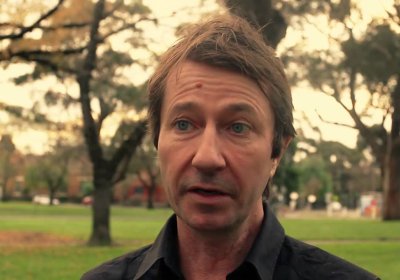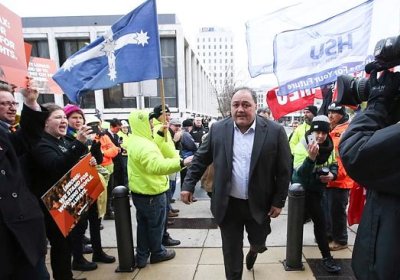For a long time, superannuation was available only to permanent public sector workers and managerial employees in the private sector. So-called “blue collar” workers were not so privileged. In the mid-1980s, only about a quarter of these workers had access to superannuation, more often than not following union-led campaigns in targeted industries.
1064
 Anti-water charge protests in Letterkenny, County Donegal on November 1.
The Irish government’s unpopular public utility, Irish Water, has been dealt a body blow. It failed two key tests within the space of a fortnight — gifting a huge victory to opposition parties and the huge anti-water charges movement.
Anti-water charge protests in Letterkenny, County Donegal on November 1.
The Irish government’s unpopular public utility, Irish Water, has been dealt a body blow. It failed two key tests within the space of a fortnight — gifting a huge victory to opposition parties and the huge anti-water charges movement.
The conservative right has launched a last ditch campaign to swing public opinion away from support for marriage equality.
The Marriage Alliance, a new organisation dedicated to opposing what it sees as a threat to “family values”, was launched on August 2. Backed by wealthy businesspeople, the campaign hopes to scare people away from marriage equality by raising vague but menacing threats about damage to children and loss of “rights and freedoms”.
When Tony Abbott’s government asked the Productivity Commission to review Australia’s “workplace relations framework” it was for the sole purpose of providing it with cover for more attacks on workers’ pay and conditions.
One of its terms of reference was to examine the ability that employers had to “flexibly” manage and engage with their employees.
Flexibility is a word that once commonly conveyed a positive sense of resourcefulness and adaptability. But the notion of flexibility that the Productivity Commission refers to is one shaped by employers.
Activists are hoping that a bill to tighten the rules governing unconventional gas exploration and production in New South Wales will pass the Legislative Council on August 13.
Such is the groundswell of opposition to this part of the fossil fuel industry, a Greens Bill has support from NSW Labor and a couple of small right-wing parties.
Greens MP Jeremy Buckingham told Green Left Weekly that he expects the Bill to pass, with amendments proposed by Labor.
Public disgust at Bronwyn Bishop's $5000 helicopter ride from Melbourne to Geelong is entirely justified. However, Tony Abbott's “root and branch” review of politicians' “entitlements” is designed to whitewash, not solve, the problem. After all, it is not as if we haven't had “root and branch” inquiries into politicians' entitlements before.
The midnight text message that sacked 100 workers — this is the face of Australian industrial relations today.
Workers at Hutchison Ports in Sydney and Brisbane received their marching orders by text and email overnight on August 7, informing them that their positions had been made redundant, there were no redeployment opportunities and their personal belongings would be couriered to them.
The Papua New Guinea Supreme Court has declared an inquiry into the Manus Island detention centre null and void because of perceived bias.
The court unanimously decided that Justice David Cannings, who started the inquiry, could not, according to PNG law, also preside over the proceedings. He also failed to disclose that an expert witness was his friend.
Victoria Police announced on August 6 they had arrested and charged a 38-year-old man in connection with death threats made against Socialist Party councillor Steve Jolly, from Yarra Council in Melbourne’s inner north. The threats referred to Jolly’s prominent role in mobilisations countering the far right Islamophobic groups Reclaim Australia and United Patriots Front (UPF).
More than 100 unionists rallied in freezing conditions outside the ACT Magistrates Court on August 5 in support of Construction Forestry Mining and Energy Union (CFMEU) official John Lomax.
Lomax was charged with blackmail last month in relation to evidence given to the Royal Commission into Trade Union Governance and Corruption. He pleaded not guilty.
The charges follow the arrest of former CFMEU organiser Fihi Kivalu on blackmail charges following allegations that he demanded bribes from ACT builders to secure them work.
Temperatures across the Middle East this week have soared in an unprecedented heat wave, forcing residents to stay indoors.
In the Iranian city of Basrah, located in the epicentre of the heat wave, temperatures exceeded 48°C for the seventh day in a row on August 1.
On the same day, the Iraq capital of Baghdad sweltered through its fourth consecutive day of temperatures higher than 48 degrees. Governments from both countries have been forced to declare public holidays to protect people from the sweltering temperatures.
 “What we do matters.” “We are many, they are few.” “The squeaky wheel gets the grease.”
These phrases are what people trying to effect change often say quietly to avoid slouching into despair. Today, they are what crews of Bostonians are singing to one another over rowdy, joyous toasts, confident that their actions just beat back the most powerful plutocrats in town.
“What we do matters.” “We are many, they are few.” “The squeaky wheel gets the grease.”
These phrases are what people trying to effect change often say quietly to avoid slouching into despair. Today, they are what crews of Bostonians are singing to one another over rowdy, joyous toasts, confident that their actions just beat back the most powerful plutocrats in town.
- Previous page
- Page 2
- Next page









